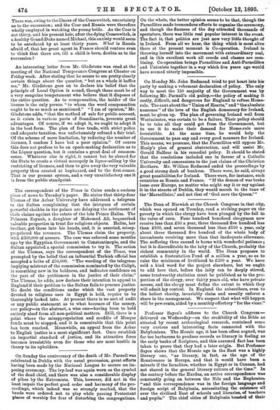The correspondent of the Times in Cairo sends a curious
piece of news to Tuesday's paper. He states that thirty-four Ulemas of the Azhar University have addressed a telegram to the Sultan complaining that the intrigues of certain powerful sheikhs in the palace are delaying the settlement of their claims against the estate of the late Prince Halim. The Princess Zeynab, a daughter of Mahomed Ali, bequeathed valuable properties in trust for religions objects. Halim, her brother, got these into his hands, and, it is asserted, misap- propriated the revenues. The Ulemas claim the property, with £300,000 of arrears. The case was referred some months ago by the Egyptian Government to Constantinople, and the Sultan appointed a special commission to try it. The action of the Ulemas, says the correspondent of the Times, was prompted by the belief that an influential Turkish official has accepted a bribe of £50,000. " The wording of the telegram, implying mistrust of the commission nominated by the Calipb, is something new in its boldness, and indicates confidence on the part of the petitioners in the justice of their claim." The Ulemas, he adds, now declare their intention to appeal to England if their petition to the Sultan fails to procure justice. No doubt the conditions under which the vast property devoted to religious uses in Egypt is held, require to be thoroughly looked into. At present there is no sort of audit or any public statement as to what becomes of the money, our policy—in the abstract, a wise one—having been to hold entirely aloof from all non-political matters. Still, there is a point where the misappropriation and muddle of Mosque funds must be stopped, and it is conceivable that this point has been reached. Meanwhile, an appeal from the Azhar to English justice is a most significant fact. Once establish an impartial standard of justice, and its attractive force becomes irresistible even for those who are most hostile in theory to its upholders.


















































 Previous page
Previous page